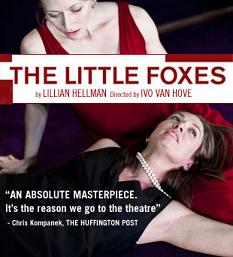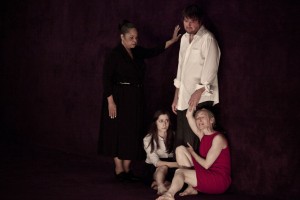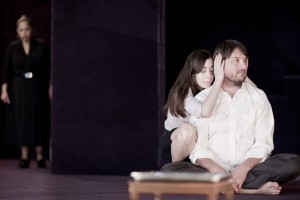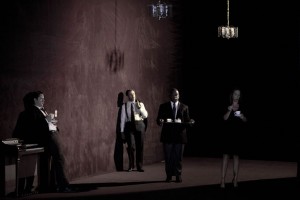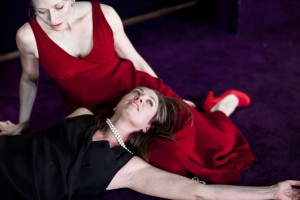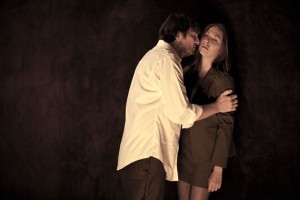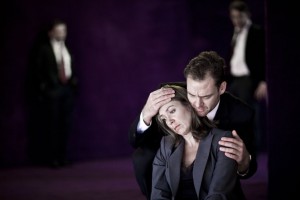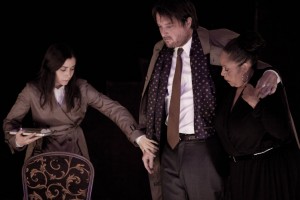HOW TO SEE A CLASSIC PLAY WITH FRESH EYES
When I first heard that avant-garde director Ivo van Hove would be staging a production of The Little Foxes at New York Theatre Workshop, the pairing confused me. As a rather conservative person when it comes to theatrical likes and dislikes, I had a notion of what The Little Foxes was meant to look and feel like, and I was not sure that I wanted that notion to be challenged. What I saw more than challenged my expectations’”it blew them away and made me see, for the first time, the core of a play I had thought I knew well. Ivo van Hove has taken Lillian Hellman’s 1939 melodrama and stripped it to its fundamentals. Without the barriers of Southern accents, fussy tchotchkes, and gowns with bustles and sweeping trains, Hellman’s characters become more real, more raw, and infinitely more disturbing.
As the play opens, the Giddens family, comprised of siblings Ben, Oscar, and Regina, is just closing a deal with a Chicago businessman that will make them all wealthy. Though Mr. Marshall of Chicago assumes that he is dealing with the last of the Southern aristocracy, Ben (Marton Csokas) proudly points out that the Giddens’ current position is entirely self-made; the only member of the fallen aristocracy is Birdie (Tina Benko), Oscar’s disturbed, abused, alcoholic wife. A less perceptive director and less honest actress might have fallen into the trap of portraying Birdie as the flighty, silly, harmless woman her family believes her to be. Instead, assisted by Kevin Guyer’s costumes (Birdie is always in red, while the rest of the characters wear mostly black), she becomes the focal point of the play, an example of a life destroyed by this family’s cruelty.
Van Hove’s Giddens family makes no secret of its violent nature. When Alexandra, traditionally portrayed as rather mealy-mouthed (but fiercely played here by Cristin Milioti) grabs her cousin Leo (Nick Westrate) by the hair to threaten him, it bodes of worse things to come. Later, we learn that plans are in motion for an arranged marriage between Alexandra and Ben, as a way of keeping all the newfound riches in the family. Frantically, Birdie tries to warn Alexandra of this plot: “I couldn’t stand to think about such a thing’¦Don’t you understand? They’ll make you.” As Oscar steps out of the shadows, a deadly hush falls over the audience. Having already seen what even the youngest members of this family are capable of, how will Birdie be punished for this act of betrayal? Stripped of the anchoring points of time and place, the ensuing violence is agonizingly real. We are left to think about what it means, not for a Southerner in 1900 to slap his wife, but for a man to punch a woman in the stomach and then do it again, over and over, every time she tries to rise from the ground. This lens of reality occurs many times throughout the play; as familiar lines are spoken in new contexts, we are forced to think about what it means for people to truly behave in this way.
Too much cannot be said about Elizabeth Marvel, the stunningly intense and powerful actress who inhabits the calculating Regina Gibbons. Regina’s great gift is the ability to use others to give her what she wants, and what she wants is money and status. Her tragic flaw is overconfidence; she underestimates her ailing husband, Horace (Christoper Evan Welch) and her daughter, and in the end, they both outthink her. This production of The Little Foxes would be worth seeing for Ms. Marvel’s performance alone; that combined with everything else makes this a nearly flawless production and a once in a lifetime experience.
photos by Jan Versweyveld
The Little Foxes
New York Theatre Workshop
79 East Fourth Street
ends on October 31, 2010
for tickets, call 212.460.5475 or visit NYTW
